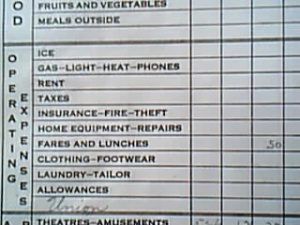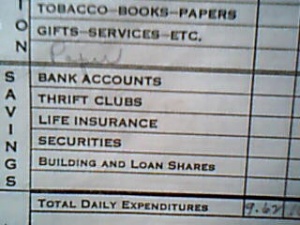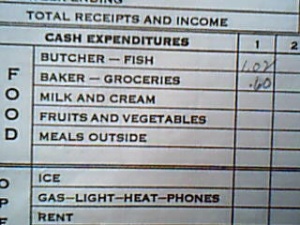A friend loaned me her parent’s budget books, one from 1940, one from 1974. They are a generation apart and reflect both simpler times and the evolution of our relationship with money to the confusing or even desperate situation we are in today.
Joe Dominguez was born two years before the first book, and raised with those values of thrift and savings. Most months this family saved 10%-20% of their income. “If you know how to spend less than you earn, you have the key to success” is the quote from Ben Franklin at the top of one page. By 1974 the family spent at or more than their income 5 months of the year, but their savings rate was still nearly 5%. Until this Recession spooked us into saving again (and we are being shamed for doing so – spend! Is still the economy’s message), our savings rate was negative, and most households carried debt.
Joe used to say it was pitiful that we needed to teach the idea that if you spend less than you earn you develop savings that can eventually allow you to stop working for money. “Ben Franklin would be rolling over in his grave” was his frequent head shaking comment when people would call his ideas radical.
Sigh.
Here are some pages from these budget books.


Can we go back to simpler times? I think we have no choice but to learn from what generations before knew – though we’ll do so in our liberated and interconnected and computer mediated style. I also think this is good news.

Not only will more of us be financially secure, more will be empowered by managing their lives with thrift.

We’ll relearn what was called “home production” (remember shop and Home Ec) because we’ll realize how much less exposure to a fickle economy we have when we can do for ourselves. “It is not so hard to earn money as to spend it wisely” the Budget Book reminds us. “Men (sic) know not how great a revenue Economy is” Franklin is quoted on another page. (I just have to comment … The book is called “Housewife’s Daily Recording Expense Book” but men are credited with thrift. We have come a long way, baby.)
The categories themselves say a lot about life then – and perhaps in the future. There is no Walmart or Safeway. There are the butcher, the baker, the milkman, the green grocer.
The savings included Thrift Clubs. Putting away a bit each month.
Operating Expenses included ice! And the tailor. That would be a growth industry of the future.
So in all, we can meditate on these pictures as a way to meditate on balance and security in our lives. And then, as we suggest in Your Money or Your Life in our quaint way, track, categorize and evaluate out expenses… and save save save for with Climate Change there may be more rainy days in our future.

I find this just fascinating. It amazes me how complex our systems have become and how in that complexity we become more easily disconnected (ie-using a debit or credit card vs. cash). There is something so tangible about cash in your wallet and knowing you have $200, for example, to cover all your expenses for that week. It makes me think that this complexity is replicated in our corporate world with the credit default swaps and other market instruments seemingly designed so complex as to be misunderstood and misused almost taking us over the brink while making millions for investment bankers and widening the economic divide. How to return to simpler times???
Vicki,
Great article. Would love to know if such budget books are still available and where one might get them. Do you know?
Thanks for this!
Cheers, Dolly
I have no idea about the budget books! But YMOYL does recommend you set up your own categories and keep track in ways that work for you, be it budget books, receipts or computer programs. the benefit of tracking and categorizing is that the awareness that comes challenges you in ways you wouldn’t do otherwise.
No idea where to get such budget books! thanks for reading
One of the things I “inherited” from my Grandmother was her budget book. She wrote down everything she spent on the house, and the income that came in. It is priceless, as this book dates back to 1938. I LOVE IT! Not one category for anything electronic, except that in the 70’s she received a radio as a birthday gift.
Thanks for posting this, it reminded me to pull that book out again and remember simpler times.